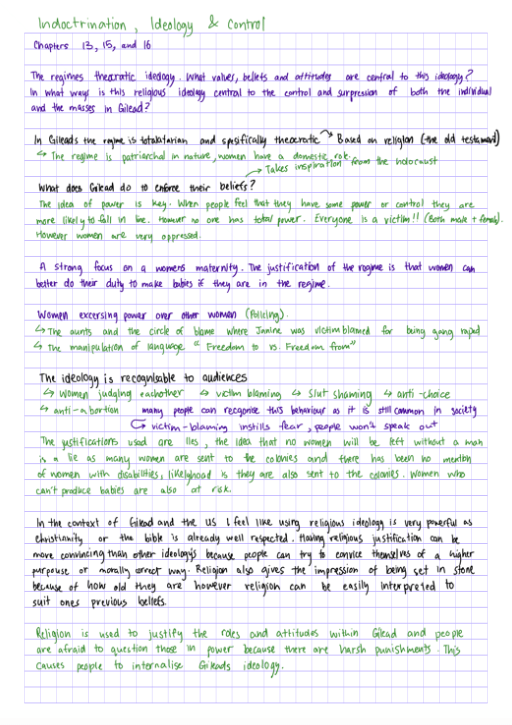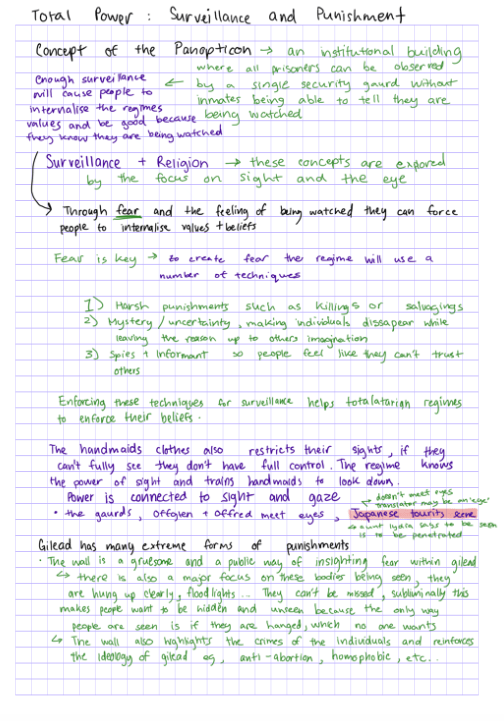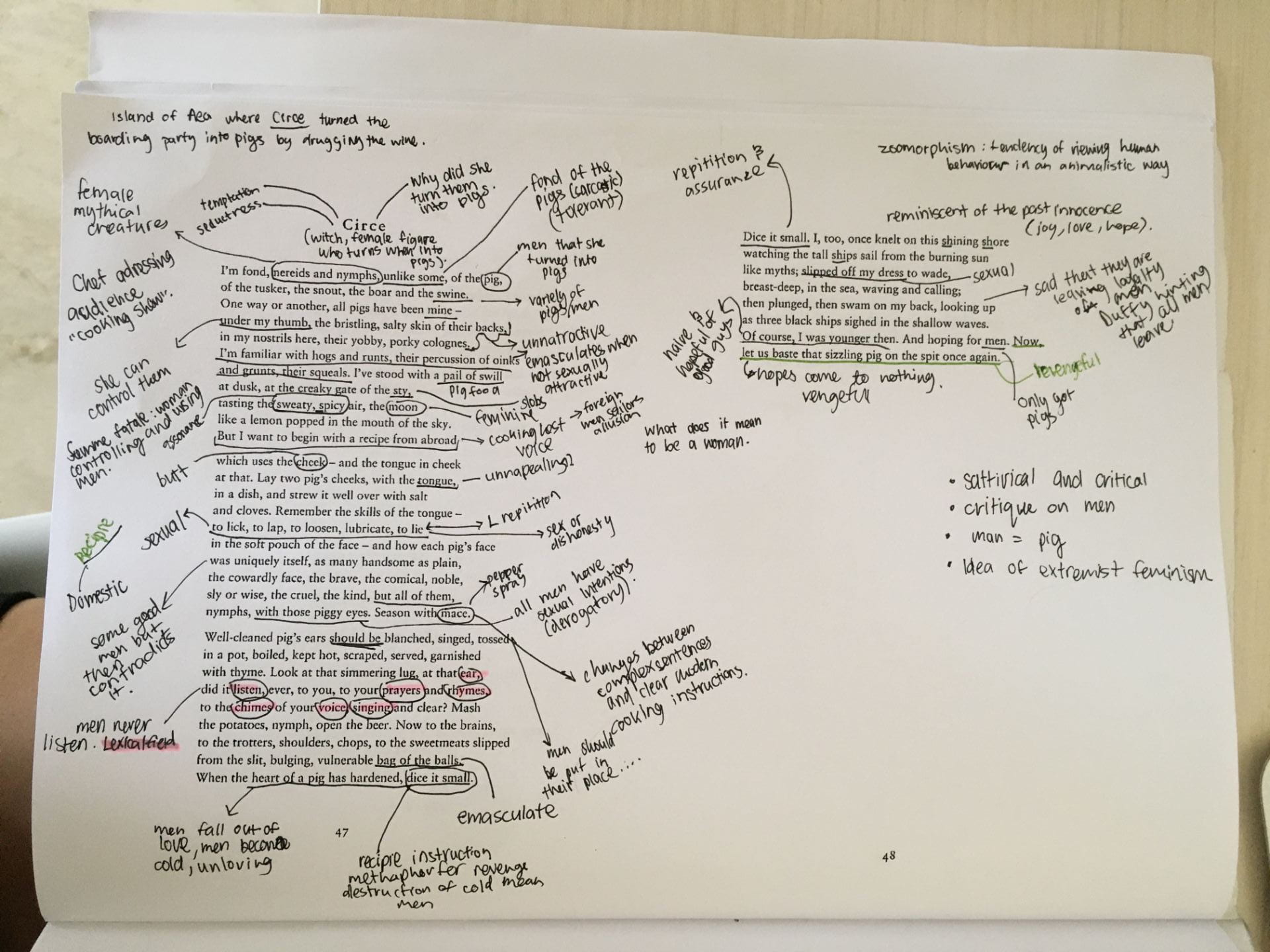ELP
Handmaid’s tale notes
Antigone essay about Power (haemon and creon extract)
How is power explored through this extract?
This extract comes from the Greek play “Antigone” which was written by Sophocles. “Antigone” explores the expression of power in the post-civil war setting of Ancient Thebes. The issue of power and justice is explored through the lens of religious laws and state laws. The ideas presented in “Antigone” are reflected in our contemporary political setting and in many ways can be related to the situations present in countries such as Afghanistan. At its core, Antigone is a play about different perspectives about the role of power and religion. Antigone believes in a higher power, Zeus, whose laws are more important than the laws of the state however Creon disagrees.
This extract uses the relationship between Haemon and Creon, between a father and son to explore Creon’s characteristics as a leader. Haemon is introduced as a voice of reason, he loves both his father and Antigone and respectfully tries to warn Creon about the implications of punishing Antigone. He explains that “the city mourns for this girl”, giving Creon the opportunity to reflect on his aim as a leader. This dialogue evokes emotions in the audience which creates sympathy in the audience. Creon’s stubbornness and ego leads him to act against the best interest of Thebes. Haemon and Creons power dynamic also shows that Haemon does not hold as much authority as he is younger, and not in a political position of power. Their power dynamic is highlighted when Creon rhetorically asks “So, men our age, we’re to be lectured are we?” This dialogue creates tension between the audience as it is made clear that Creon overpowered that of Haemons. His decisions act as a self-fulfilling prophecy, as he gets the opportunity to correct himself countless times.Though father and son, Haemon’s character is strongly contrasted by Croen’s allowing the audience to see Creon’s transition into a tyrannical leader. An understandable mistake, or difference in opinion snowballs into a tragedy. When Creon initially promotes himself into the role of king he says “the ship of state is safe ”, Haemon’s speech builds on that sailing metaphor saying “haul your sheets too taut, never give an inch, you’ll capsize”. Haemon not only foreshadows the impacts of Creon’s authoritarian ruling style, but also obviously directly shows the audience Creon’s new and changed intentions.
Religious beliefs have guided many ancient civilisations in their culture and law making, ancient Greeks are no different. This extract explores the power of religion, and the laws of the gods. In ancient Greece the laws of the gods were held to a very high regard, it was seen as a moral law which supersedes the laws of the state. Creon being the new head of state struggled with prioritising the laws of god with his own beliefs. During their heated discussion Haemon challenges Creon’s ideals of ruling “It’s no city at all, owned by one man alone” highlighting Creon’s selfish ruling style which looked out for his own selfish interests. The idea of democracy is extremely prevalent here however there is also a religious implication. The social significance of religion in ancient Greece gives more power to the laws of god and has strong influences on many laws and traditions, such as burials. The significance of the gods is highlighted when Haemon rhetorically asks “Trample down the honors of the gods?”, clearly implying that Creon’s actions oppose the values of god. Haemon, being the voice of reason and a representation of the citizens of Thebes also signals to the audience that Creon is opposing the laws which the majority believe in.
Para 3: Power and Gender:
- QUOTES
- “In fighting on her side, the woman’s side”.
- “If you are a woman, yes- my concern is all for you”
- “That’s what she is”
- Context of women in ancient greece
The idea of power is explored through many different avenue’s family, religion, justice, and politics to reflect public discourse in ancient Thebes. Play’s, specifically tragedies, allowed playwrights, such as Sophocles to explore political issues within ancient Greece and the idea of democracy and morals were highly examined. Sophocles promotes a pro-democratic narrative throughout “Antigone”, views which would have been popular in Ancient Greece during the time of the play. However, these ideas are still reflected in contemporary politics as many politicians care about their reputation and strength, so much so that they let the power go to their head and use it in the wrong way. Sophocles presents questions to the audience such as, What makes a good leader? And what is the hierarchy between religious and state laws? Sophocles highlights the imperfections of man throughout “Antigone”, and shows the dangers of having a single individual in charge of all the power. We are all imperfect beings who can be “single-minded”, “self-involved”, and “stubborn”, and without a democratic system we will ultimately lead to our own downfalls.
Feedback: Some good ideas and interpretations here, Anvita, but this does read like many ideas in a disjointed format! You needed to frame all of this in a bigger argument about the different ways in which power is depicted and explored in the play. When you quote, break down the quotation – unpack it. IN drama, you also need to consider the impact of what is happening on stage and the ways in which the characters represent something more than what they seem to be here.
My takeaways: This essay was overall really messy. In an attempt to include the many ideas that I had about this play I didn’t have a strong focus. The essay was very general and lacked a close analysis of the extracts and quotes, as well as the proper language to describe it. I think that I should have better planned my essays and expanded on specific ideas using evidence. Though the extract was long and had many ideas I think I could have broadly mentioned them without making them each a paragraph. I also needed to mention the significance of Antigone being a play and the drama aspects of it.
Comparing Duffy and Kehinde Wiley
Global issue Focus: Social Representations of masculinity
Literary Work: Delilah by Carol Ann Duffy from ‘The World’s Wife’ collection, 1999
Non-literary work: President Barack Obama, Kehinde Wiley Presidential Portrait, 2018
Overview from each collection:
“The World’s Wife” by Carol Ann Duffy is a collection of poems that recontextualises popular mythological and historical stories which have been significant in Duffy’s upbringing. She offers a female perspective on traditionally male-oriented stories, challenging the female stereotypes which have been associated with the characters. Duffy alludes to these stories while also forming a captivating social commentary (or critique) on contemporary relationships through her use of dramatic monologue’s. Universally recognisable themes such as love, jealousy, and anger and explored in a rather humorous way which makes them relatable and entertaining for a wider modern audience.
Each President of the United States has a portrait which is created to honour their presidency. President Barack Obama asked Kehinde Wiley to paint his portrait. Wiley is a traditional fine artist who typically paints oil on canvas. His style is comparable to traditional neoclassical artists, however there is one major difference, his subjects have a modern style and are often representation of black men in the US. His aim as an artist is to challenge the stereotypes which are perpetuated about black men in media. He empowers traditionally disempowered individuals. His art positions black men in power and often emulate traditional famous portraits.
Summary paragraphs on each extract:
Carol Ann Duffy explores the concept of masculinity through her poem Delilah, where Samson a strong strong warrior is depicted as vulnerable and weak. Duffy explores how love, vulnerability, and intimacy, which are often perceived as feminine qualities are powerful and valuable. Having the ability to love and be vulnerable requires trust and sacrifice, which Duffy tries to portray to Delilah’s “act of mercy”. Though the reason for Delilah’s actions is controversial, Samson’s portrayal in “Delilah” challenges the commonly held belief that being the hyper-masculine or “alpha male” is a socially admirable quality.
Kehinde Wiley challenges canonical representations of masculinity in the arts by painting Barack Obama in a grounded, eye-level pose surrounded by foliage and flowers. This contrasts with the other presidential portraits which portray the past American presidents in a traditionally masculine and powerful way. Wiley makes Obama look approachable thoughtful and kind-hearted rather than cold. He aims to empower black men by challenging stereotypes that have been perpetuated by the media.
The world’s Wife overview statment
“The World’s Wife” by Carol Ann Duffy is a collection of poems that recontextualises popular mythological and historical stories which have been significant in Duffy’s upbringing. She offers a female perspective on traditionally male-oriented stories, challenging the female stereotypes which have been associated with the characters. Duffy alludes to these stories while also forming a captivating social commentary (or critique) on contemporary relationships through her use of dramatic monologue’s. Universally recognisable themes such as love, jealousy, and anger and explored in a rather humorous way which makes them relatable and entertaining for a wider modern audience.
World’s Wife “Carol Ann Duffy” Odysseys inspired poems
‘Delilah’ Carol Ann Duffy
Carol Ann Duffy’s ‘Delilah is an ambiguous poem about the intimate relationship between Delilah and Samson. There have been many interpretations of the biblical story and Delilah’s intentions have been speculated on. Duffy challenges the one dimensional and negative femme fatale character which is often associated with Delilah. In Duffy’s somewhat satirical interpretation, Delilah cuts Samson’s hair to free him from the burden to inure, allowing him to feel vulnerable and loved. Duffy seems to make a commentary about the ideas of masculinity and liberation. In our modern context, toxic/hyper-masculinity is seen as a byproduct of the patriarchy, which forced men to hide their emotions in an attempt to be perceived as strong.
Grade 11 April Paper 1: Notes
This English Mock Exam was a very useful opportunity for me. The timed conditions and exam setting helped me better visualise and understand myself in terms of written assessments. As our IB English grades come from only 2 components (Oral and Paper1), this paper was a good practice. I have a lot of takeaways and actually recognise what mistakes I have made and what I can improve on moving forward.
| What I did well + | Where to improve – |
|
|
My aim is definitely to improve on the insightfulness of my writing and aiming for the 5/5 in the different criteria. I can do that by focusing on the context more and explaining my evidence with better terminology, overall more detail. I do think that I should try writing more essays under a timed condition because I think it will be challenging to go into depth and show strong insightful evaluation if I write slowly, (I guess just try to write faster without having bad handwriting). I can see the mistakes which I have made in this assessment and because understand it I think the idea of explaining in more depth is something I will remember to do.
Thetis (Carol Ann Duffy) Big ideas explored
Carol Ann Duffy’s poem “Thetis” is based on Greek mythology, in which she is the mother of Achilles. In Duffy’s retelling, Thetis is a woman who keeps changing her form to escape from a mysterious capturer. She starts off as a Song Bird, then becomes an albatross, snake, lion, a myriad of sea creatures (Mermaid, fish, dolphin, whale), small mammals (racoon, skunk, stoat, weasel, ferret, bat, mink, rat), and then elemental (wind, gas, hot air, clouds, hurricane), until she finally turns into a mother. In the literal sense she “transforms” in order to escape the changing form of the stalker who follows her becoming a fist, hunter with a crossbow, snake charmer, hunter with a gun, fisherman, taxidermist, fighter plane, and a groom. In the metaphorical sense, it could be interpreted as Thetis trying to find her “true form, which ends up being motherhood as that is her final form. The ending of the poem is very ambiguous as Thetis’ sentiment toward the child isn’t very detailed, it can either be interpreted as a happy ending or her unwanted child resulting in possible rape. I feel Duffy was trying to explore the modern context of how women and pursued and treated. Thetis is a symbol of women all over the world who are harassed, abused, and eventually forced into a relationship (motherhood).
Response to ” We should all be Feminists Ted Talk”
1. Adichie talked about the concept of “western ideals” and how feminism wasn’t considered African (or Nigerian), even though in its essence feminism is about equality, irrespective of ethnicity. I often see that in India, when talking to people there, bringing up topics like these is sometimes met with the response is “Oh your international school beliefs” or “so western”. I find it interesting because the conversation of gender equality is had all over the world, but the pace is what makes the difference. Traditionally countries (especially ones that have been colonised) seem to have this view that western cultures are very progressive, and that in our own home countries it would not be attainable to be as progressive. She also talked about how feminism was also used as a pejorative term. In middle school (and sometimes still) there was a negative insinuation that a feminist was loud, independent, rude, and angry, it was also often switched with the term feminazi. Noticeably however being called a “feminist” was often told to the young girls who spoke their minds, or weren’t trying to get male attention. Somehow a word that was meant to symbolise the equality of the sexes was used to press women. This was a cultural experience for women all around the world. Adichie talked about how culture is everchanging and affected by our actions, that we make culture and not the other way around. I think that was very powerful as often the phrase “But it’s in our culture” is thrown around as an excuse.
2. I agree with Adichie in that I think the definition of feminism is a man or women who advocate for gender equality and empower women. I think Men can also be feminist. I believe I am a feminist however when it is used with a negative tone, part of me wants to reject that label, as the definition in those cases is not about quality, rather about putting down one gender, or it insinuates hatred towards men.
3.I believe Adichie that “culture does not make people, people make culture” is only partly true, as we are products of the culture we are brought up in. The culture we grow up in affect how we are as people, however, I think that people can make culture too. As our beliefs evolve and many people in society change their views there is a culture shift in the way we view gender stereotypes. It is evident that culture changes and in the last 100 years many strides have been talked to tackle gender inequality. The deep-rooted patriarchy however does not disassemble over-night and is a gradual product of people changing their views and changing the culture in which kids are brought up in. I believe that once people grow up it is likely to see as much change in their generation, however, if people are brought up, without being told that they should adhere to certain strict gender expectations and that respect is something that should be given to everyone then the culture of sexism can definitely change.




